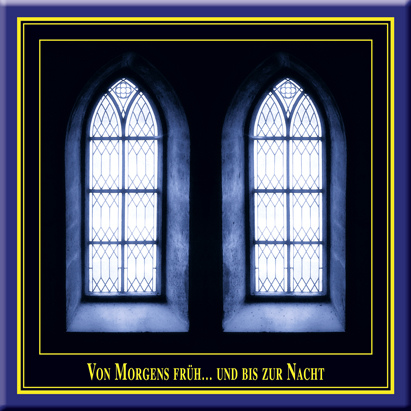
|
 |
|

|
 |
|


|
The Maulbronn Chamber Choir with works by Orlando di Lasso, Joseph Rheinberger, A recording from the UNESCO monument Monastery Maulbronn (1999) by |
|
Programme & Conception
Jürgen Budday |
|
O lux mentium O Licht der Gedanken, Gott, vertreibe von mir die Nacht der Torheit und gib mir den Tag der Weisheit. Gehe auf, Sonne der Wahrheit und der Gerechtigkeit, aus der tiefsten Tiefe deines Wesens, die alles Verstehen übersteigt. Erscheine im Himmel meiner Seele, auf Erden meinem Herzen. Vertilge also die körperlichen Gedanken und die Hirngespinste meiner Gedanken. Pflanze einen Spross deiner Erkenntnis in dem Innersten meines Geistes. Giesse deinen Heiligen Geist aus über dem Wasser meiner Hässlichkeit, damit ich zu dir gewandt und in Einklang mit deinem Sohn dich sehe und alles unter dir durch dich. O du reinste Wahrheit, schaue dich in mir, erkenne dich in mir. Durch mich selbst sehe ich nichts als Eitles, Schwankendes und Hinfälliges, sehe ich nichts als falsche und körperliche Vorstellungen. Durch mich bin ich nichts als Tod und dunkler, unvollkommener Abgrund. In dir bin ich, soweit ich bin. In dir lebe ich, soweit ich lebe. In dir erkenne ich, soweit ich erkenne, denn du bist die höchste Einsicht, die höchste Wesenheit, das höchste Leben. Vater, Sohn und Heiliger Geist, dreifache Einheit, einfache Dreiheit in sich, dem unendlichen Gott, ein Gott ohne Ende von Ewigkeit zu Ewigkeit. Amen |
|
Maulbronn Chamber Choir Juergen Budday |
|
The Maulbronn Chamber Choir
2. Laudate omnes gentes 3:26 3. Morgenlied 4:31 4. Psalmgebet 6:04 5. Canticum 6:57
6. O lux mentium 9:14 7. Psalmgebet 3:41 8. Verleih uns Frieden gnädiglich 1:40
9. Bleib bei uns, denn es will Abend werden 3:29 10. Cantus gloriosus 3:45 11. Canticum 6:32
12. Hear my prayer, o Lord 6:22 13. Canticum 4:36 14. Der Mensch lebt 3:01 |
|
About the edition Concerts from Maulbronn Monastery, a UNESCO's World Heritage Site The Edition Josef-Stefan Kindler |
|
Choir and Choral Music Webring Hosted by Stockholm Webmusic. Show me: [ Previous | Random | Next | Next 5 | All ] |